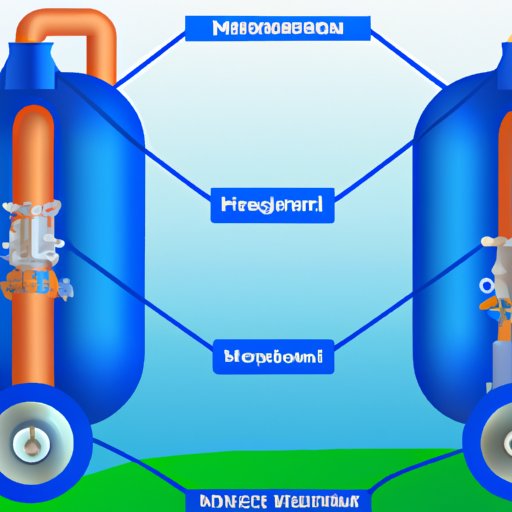Introduction
A hydrogen engine is an internal combustion engine that uses hydrogen as its fuel instead of gasoline or diesel. This type of engine is gaining popularity due to its potential to reduce emissions and reliance on fossil fuels. But how does a hydrogen engine actually work? In this article, we will explore the mechanics of a hydrogen engine and the science behind it. We will also examine the benefits of switching to this renewable energy source and compare it to traditional gasoline engines.

Exploring the Mechanics of a Hydrogen Engine
To understand how a hydrogen engine works, it is important to first know the different parts of the engine. The main components of a hydrogen engine are: the fuel injector, spark plug, intake valve, exhaust valve, cylinder, piston, and crankshaft. Each part plays an essential role in the functioning of the engine.
The fuel injector delivers hydrogen into the combustion chamber. The spark plug ignites the mixture of hydrogen and air, which then powers the engine. The intake and exhaust valves open and close to allow the entry and exit of the combustion gases. The cylinder contains the piston, which moves up and down to create pressure inside the cylinder. Finally, the crankshaft converts the piston’s linear motion into rotary motion, which turns the wheels of the car.

An Overview of How Hydrogen Engines Work
Once the different parts of a hydrogen engine are understood, it is easier to see how they all work together. When the driver presses down on the accelerator, the hydrogen is injected into the combustion chamber. The spark plug then ignites the mixture of hydrogen and air, causing an explosion. This explosion pushes the piston downward, creating pressure inside the cylinder. The pressure forces the exhaust gases out of the exhaust valve, while the intake valve opens to allow fresh air and hydrogen to enter the combustion chamber.
Once the piston reaches the bottom of the cylinder, the crankshaft converts the piston’s linear motion into rotary motion. This rotary motion turns the wheels of the car and propels it forward. The fuel injection system then stops injecting hydrogen and the cycle starts again.
Exposing the Science Behind Hydrogen Engines
The combustion process of a hydrogen engine involves several chemical reactions. According to research conducted by the University of Michigan, “the primary reaction that produces energy in a hydrogen engine is the combustion of hydrogen with oxygen, which produces water and heat.” This reaction releases energy, which is converted into mechanical energy by the engine.
In addition to the combustion process, the engine also relies on other chemical reactions such as the oxidation of hydrogen and the decomposition of water molecules. These reactions help to maintain the temperature and pressure needed for the combustion process to take place.
Comparing Hydrogen Engines to Traditional Gasoline Engines
Hydrogen engines are more efficient than traditional gasoline engines. According to a study conducted by the National Renewable Energy Laboratory, “hydrogen engines can convert up to 40 percent of the energy stored in the fuel into useful work, compared to 25 percent for gasoline engines.” In addition, hydrogen engines are also cheaper to operate than gasoline engines due to the lower cost of hydrogen fuel.

Understanding the Benefits of Hydrogen Engines
One of the biggest benefits of hydrogen engines is that they produce fewer emissions than traditional gasoline engines. According to the Environmental Protection Agency, “hydrogen engines produce significantly fewer greenhouse gas emissions than gasoline engines.” This makes them a cleaner, more environmentally-friendly option for powering vehicles.
In addition, hydrogen is a renewable energy source. Unlike gasoline, hydrogen can be produced from renewable sources such as water and solar power. This makes it a much more sustainable and eco-friendly option for powering vehicles.
Conclusion
In conclusion, hydrogen engines are a promising alternative to traditional gasoline engines. They are more efficient and cost-effective, and they produce fewer emissions. They also rely on a renewable energy source, making them a more sustainable choice for powering vehicles. Understanding the mechanics and benefits of hydrogen engines is essential to making the switch to this clean, renewable energy source.
(Note: Is this article not meeting your expectations? Do you have knowledge or insights to share? Unlock new opportunities and expand your reach by joining our authors team. Click Registration to join us and share your expertise with our readers.)
